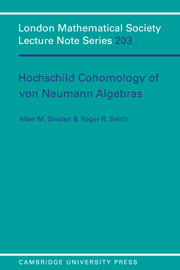1 - Completely Bounded Operators
Published online by Cambridge University Press: 29 September 2009
Summary
Introduction
This chapter contains much of the background material which is necessary for the study of the cohomology theory of von Neumann algebras. In Sections 1.2 and 1.3 we introduce the basic concepts: operator systems, operator spaces, completely positive maps and completely bounded maps. The two fundamental results in the subject are the Stinespring representation theorem (Theorem 1.2.1) and Arveson's Hahn–Banach theorem for completely positive maps (Theorem 1.2.3). We then discuss matrix ordered spaces, and obtain an important abstract characterization of operator systems (Theorem 1.2.7). With these results established, the representation of a completely bounded map as V*πW (Theorem 1.3.1) is easily obtained.
The fourth section is devoted to the Haagerup tensor product of operator spaces, in preparation for the succeeding section where complete boundedness is introduced for multilinear maps. The point is that multilinear maps can be viewed as linear maps on tensor products. The Haagerup tensor product norm is the correct one for compatibility with the completely bounded norm, and this allows us to prove multilinear results by appealing to the linear theorems of the second and third sections. The most important theorems here are 1.5.6 and 1.5.8. The first gives a general representation theorem for multilinear completely bounded maps on operator spaces, while the second describes an improved version for completely bounded maps on von Neumann algebras which are separately normal in each variable.
- Type
- Chapter
- Information
- Hochschild Cohomology of Von Neumann Algebras , pp. 11 - 59Publisher: Cambridge University PressPrint publication year: 1995



